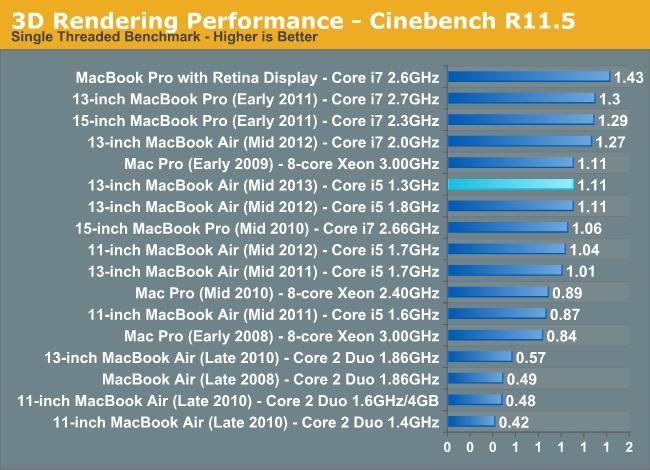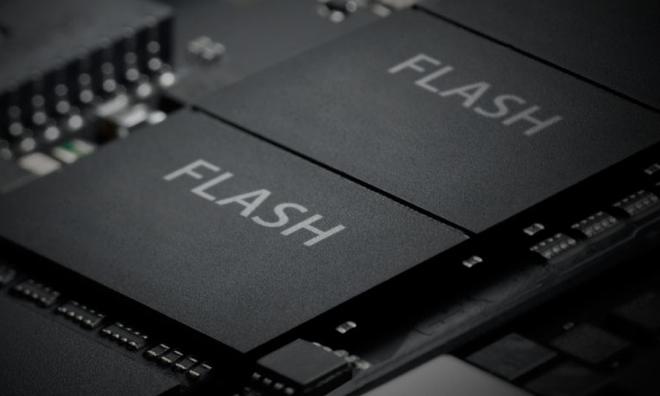The most significant raw performance boost in Apple's updated MacBook Air lineup comes from new PCI Express flash memory, while Intel's latest Haswell processors are more focused on extending battery life than pushing horsepower.
After getting his hands on Apple's new 2013 MacBook Air, Anand Lal Shimpi of AnandTech put the hardware through some initial tests to see how it performs. Equipped with a 1.3-gigahertz Core i5 Haswell processor, the 13-inch model is on par with the 1.8-gigahertz Core i5 Sandy Bridge processor found in last year's 13-inch model.
But of course Intel's new processors are really about the battery life: Apple has promised that the updated MacBook Air models will offer all-day battery life. Specifically, the 13-inch model is said to boast an average of 12 hours of use, while the 11-inch model will provide 9 hours of uptime.

CPU performance test conducted by AnandTech. The most gains from Intel's Haswell come from battery life.
Those improvements come in spite of the fact that the battery capacities on both the 11- and 13-inch models are unchanged from their predecessors, owing the power improvements to Intel's latest chips.
Separate tests conducted by Primate Labs show the new 2013 MacBook Air offering performance improvements between 3 and 8 percent, while reducing power consumption by up to 25 percent.
The real speed boosts in Apple's new MacBook Airs come from the inclusion of flash memory that now uses ultrafast PCI Express connectivity. Tests show that the new storage method offers peak sequential read/write performance of nearly 800MB/s.
"This is a pretty big deal, as it is probably the first step towards PCIe storage in a mainstream consumer device that we've seen," Shimpi said.
Previous generation MacBook Air models used the SATA interface, which maxes out at about 600MB/s. Apple also plans to use PCI Express connectivity for its forthcoming overhaul of the Mac Pro desktop.
Not featured in the latest tests is the new 802.11ac Wi-Fi found in Apple's latest MacBook Air models. The high-speed wireless connectivity can be achieved when paired with Apple's new AirPort Extreme and Time Capsule models.
Aside from the aforementioned performance and battery life improvements, the new MacBook Air models also come with more storage at a lower price than their predecessors. The 11-inch MacBook Air now comes with 128 gigabytes of flash storage at its $999 starting price, while the 13-inch model also includes 128 gigabytes for a $1,099 entry price.
 Sam Oliver
Sam Oliver

-m.jpg)






 William Gallagher
William Gallagher

 Andrew O'Hara
Andrew O'Hara
 Wesley Hilliard
Wesley Hilliard

 Malcolm Owen
Malcolm Owen
 Marko Zivkovic
Marko Zivkovic





-m.jpg)




49 Comments
It can also be configured with a dual core 1.7GHz i7 which is a good deal more powerful. So that config would be more powerful than last year's by a fair amount. I figure that Apple feels that for the base config, battery life is of utmost importance.
It's really unnecessarily confusing how this article refers to "Flash memory" when it's really talking about the Flash *drive*.
from my point of view I see no reason to upgrade from my 2012 MBA as I would like more CPU performance and memory capacity. Would have been nice to have an option for a more powerful cpu which retained the 2012 battery life performance.
[I][/I]I'm selling my 2013 iMac and getting one of these. The 13". I'm not happy with the iMac for a number of reasons I won't go into now, because I'm not in the mood to defend the truth to a few defensive people.
When Mavericks comes out, there will be even more battery savings. That demo suspending the safari window when you covered it up and starting it up again when you uncover it was amazing. I'm sure that feature will intelligently do it or have manual override based on the function. I wouldn't want a video render being suspended because I move another window over it.